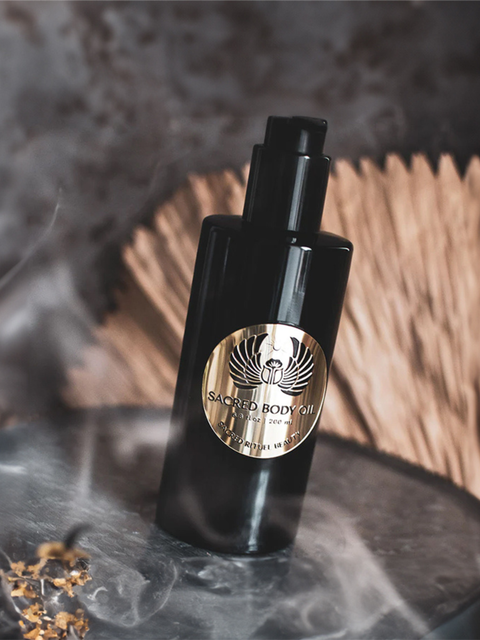
Nourishing Your Skin: Decoding The Difference Between Body Oil And Lotion
Key Takeaways
- Tailoring to Your Skin's Desire: Body oils provide a rich, concentrated form of hydration and nutrients, making them ideal for dry or mature skin that requires deep moisturization.
- The Light Touch of Daily Moisture: Lotions offer a lightweight, versatile form of hydration suitable for a variety of skin types and are perfect for quick absorption and non-greasy application.
- Synergy in Skincare Choices: Combining body oils and lotions in your skincare routine allows for personalization and adaptability, addressing specific skin needs while indulging in self-care rituals.
In the quest for hydrated, supple, and radiant skin, the dilemma of choosing between body oil and lotion often arises. Consumers are increasingly becoming more conscious of the ingredients in their skincare products and how these can affect their skin's health. Sacred Rituel, a brand that prides itself on catering to the discerning skincare enthusiast, understands the importance of informed choices in daily skincare rituals. For those who seek the essence of purity and luxury in their products, understanding the contrasting qualities of body oils and lotions is crucial. This article explores the key differences, allowing you to make an enlightened decision on "body oil vs lotion."
Nourish and Cherish: Choose Sacred Body Oil to nourish your skin deeply and cherish every sacred moment of your self-care journey.
Understanding Skin Types And Their Needs
Identifying your skin type is the first step to choosing the right skincare products. Common skin types include normal, dry, oily, combination, and sensitive, each with specific needs and ideal care routines. Dry skin types crave intense hydration and may benefit from richer, oil-based moisturizers. Oily and combination skin types require lightweight formulations that balance hydration without clogging pores. Sensitive skin demands gentle, hypoallergenic ingredients that soothe and reduce irritation while maintaining skin health.
Reveal The Radiance Within Your Skin With Sacred Rituel
Ready to pamper your skin? Explore our collection and find your perfect match today. Shop Now |
What Is Body Oil?
Body oil is an emollient that delivers high-potency nourishment to the skin’s outer layer. It’s crafted by extracting natural oils from plants, seeds, or nuts, creating a pure, essential remedy that feeds the skin. Unlike lotions, body oils lack water content, ensuring a concentrated formula rich in nutrients. They form a protective barrier, trapping moisture and delivering lasting hydration. Body oils are especially cherished for their simplicity and the luxurious sheen they impart to the skin.
Key Ingredients In Body Oils
The most effective body oils feature ingredients like Jojoba, Argan, and Coconut oils, which closely mimic the skin's natural sebum. Essential oils such as Lavender or Chamomile provide therapeutic scents and additional skin benefits. Vitamin E is a common addition, known for its antioxidant properties and skin repair capabilities. Omega fatty acids present in oils like Rosehip promote skin elasticity and cell regeneration. Each of these key ingredients plays a role in skin health, offering a tailored nourishment profile to meet various skincare needs.
Benefits Of Body Oil For Skin Health
Deep Moisturization
Body oils are renowned for their ability to deliver a profound level of hydration to the skin. Their unique formulation allows them to penetrate deeply into the skin's surface layers, reaching where traditional lotions might not. Once absorbed, these oils form an occlusive barrier, sealing in moisture and preventing water loss. This intensive hydration not only addresses dryness but also provides relief for even the most severe cases of dehydrated skin. By restoring and maintaining optimal moisture levels, body oils help promote skin suppleness, smoothness, and resilience, effectively combating dry, flaky skin conditions.
Antioxidant Protection
A notable feature of many body oils is their richness in antioxidants. These antioxidants play a pivotal role in shielding the skin from environmental aggressors and free radicals, which can cause cellular damage and contribute to premature aging. By neutralizing these harmful particles, body oils act as a formidable defense system, protecting the skin from oxidative stress and supporting a healthier, more youthful complexion over time.
Enhanced Elasticity
The nourishing components found in body oils, particularly the abundance of essential fatty acids, offer immense benefits in enhancing the skin's elasticity and firmness. These essential fatty acids aid in fortifying the skin's natural structure, promoting improved elasticity, and reducing the visibility of fine lines and wrinkles. Consistent use of body oils assists in maintaining a supple and toned skin appearance, minimizing the effects of sagging and contributing to a more youthful and rejuvenated look.
A Soothing Touch
Beyond hydration and protection, body oils possess inherent soothing properties that can significantly benefit the skin. This soothing effect is often amplified by the inclusion of essential oils known for their calming and therapeutic attributes. These oils work synergistically to soothe redness, alleviate irritation, and reduce inflammation, offering a gentle and comforting touch to the skin. This calming sensation not only enhances the overall skincare experience but also contributes to a more serene and balanced skin condition.
Embrace the Glow: Uncover the secret to deeply nourished skin with Sacred Rituel's luxurious Body Oil—your pathway to a divine glow.
What Is Lotion?
The lotion is a hybrid mix of oil and water components combined with emulsifiers, humectants, and other active ingredients to create a light, easily absorbed skin hydrant. It's specifically formulated to increase the skin's moisture content without the heaviness associated with pure oils. Lotions often include additional ingredients like fragrances and botanical extracts to address specific skin concerns and enhance the user experience. They are versatile and can be tailored to suit different skin types and conditions. Lotions are the go-to daily moisturizer for many due to their non-greasy finish and quick absorption.
Components That Define Lotions
The base of the lotion consists of an oil-in-water emulsion, creating a lighter texture compared to pure oils. Humectants like glycerin or hyaluronic acid are key components, drawing moisture into the skin. Emollients within lotions, such as Shea butter and Squalane, soften and smooth the skin's surface. Preservatives ensure the product’s shelf stability by preventing microbial growth. Many lotions also feature specialty additives, like sunscreens or exfoliants, to provide additional benefits beyond hydration.
Advantages Of Lotions In Skincare
Versatility For All Skin Types
Lotions stand out for their versatility, as they come in diverse formulations tailored to meet the unique needs of various skin types. This versatility renders them suitable for almost any skin condition or type, offering a wide range of options to address specific concerns.
Lightweight Hydration
The oil-in-water composition of lotions offers a perfect balance, delivering essential hydration without the heaviness or greasy residue often associated with heavier creams or oils. This lightweight nature makes lotions an excellent choice, particularly for individuals seeking hydration that doesn't weigh down the skin, ideal for daily use under makeup or in warmer climates where heavier formulations might feel uncomfortable.
Targeted Treatment Options
The flexibility of lotions lies in their capacity to incorporate an array of active ingredients, allowing for customized solutions tailored to address precise skincare needs. Whether combating acne, targeting discoloration, or addressing signs of aging, lotions can be formulated with specific actives to provide targeted treatments, offering effective solutions for various skin concerns.
Rapid Absorption
The lighter texture of lotions enables swift absorption into the skin, facilitating quick penetration without leaving behind a greasy or sticky residue. This characteristic makes lotions an optimal choice, especially for individuals leading busy lifestyles, as they seamlessly integrate into daily routines without requiring extensive waiting times for absorption.
Practical Application Tips For Body Oils And Lotions
Timing Matters
The timing of skincare application plays a crucial role in maximizing its benefits. Applying body oil to damp skin right after a shower is an effective way to seal in moisture. The dampness allows for better absorption, locking in hydration for smoother, more nourished skin. On the other hand, lotions can be used at any time throughout the day for quick hydration, providing an instant boost of moisture whenever needed.
Layering Techniques
For individuals dealing with extra dry skin, employing a layering technique can significantly enhance hydration. Begin by applying lotion to the skin, allowing it to absorb and provide initial moisture. Follow up by sealing in this hydration with body oil, creating a dual barrier against dehydration. This combination helps lock in moisture effectively, offering long-lasting relief for intensely dry skin.
Portion Control
Body oils are highly concentrated, requiring careful usage. It's advisable to use them sparingly to avoid excess greasiness or residue. Opt for a small amount, often just a pea-sized quantity, especially when targeting specific areas like the hands or face. Similarly, when using lotion, a pea-sized amount is often sufficient for targeted application, ensuring effective hydration without overwhelming the skin.
Application Method
The method of application contributes to the effectiveness of skincare products. When applying body oil, employing a gentle massage in circular motions not only aids absorption but also provides a therapeutic experience, stimulating blood flow and enhancing relaxation. Conversely, when applying lotion, using smooth and upward strokes encourages skin firmness and supports circulation, contributing to a more toned and revitalized skin appearance.
Integrating Body Oils And Lotions Into Self-Care Rituals
Create A Sensorial Experience
Elevate your skincare routine by selecting products with scents that resonate with your senses, whether they relax or invigorate you. Choosing lotions or body oils with fragrances that appeal to your preferences can transform your everyday skin nourishment routine into an aromatic journey. This sensorial experience not only nurtures your skin but also indulges your senses, enhancing your overall well-being.
Nighttime Nourishment
Incorporating body oils into your nightly skincare routine is a wonderful way to support your skin's repair processes during sleep. Body oils provide deep nourishment and moisture, aiding the skin's rejuvenation overnight. Conversely, using lotions as part of your morning regimen ensures all-day hydration, helping your skin stay supple and refreshed throughout the day.
Pair With Exfoliation
Maximize the benefits of your skincare routine by combining exfoliation with the application of body oil or lotion. After exfoliating, whether using a scrub or exfoliating glove, applying body oil or lotion to freshly revealed skin enhances absorption. The exfoliation process primes the skin, allowing the body oil or lotion to penetrate more effectively, providing optimal nourishment and leaving your skin feeling smooth and revitalized.
Ritual Of Relaxation
Designate a special time in your schedule for self-care and relaxation. Approach the application of body oil or lotion mindfully, allowing yourself to fully immerse in the experience. Embrace this moment as a stress-relieving ritual, focusing on the sensation and benefits of the skincare routine. By indulging in this intentional self-care practice, you not only nurture your skin but also promote relaxation and rejuvenation for your mind and body.

Choosing The Right Skincare Product For Your Needs
Consider Your Skin Type
Understanding your skin type—whether it's dry, oily, combination, or normal—plays a pivotal role in determining the most suitable skincare product for your routine. For those with dry skin, body oils may offer deeper hydration, while lotions might be preferable for individuals with oily or combination skin due to their lighter texture.
Look At Ingredients
Taking a closer look at product ingredients is crucial, especially for sensitive skin or when targeting specific skin concerns. All organic ingredients are essential for getting the optimal use of products. For sensitive skin types, opt for products with minimal and natural ingredients to minimize the risk of irritation. For addressing specific skin issues like acne, discoloration, or signs of aging, selecting products with active ingredients tailored to target those concerns can yield more targeted and effective results.
Final Thoughts On Body Oil vs Lotion
In the end, whether you choose body oil or lotion depends on personal preference, lifestyle, and your skin's unique needs. By understanding the benefits and particularities of each, you can enhance your skincare regimen effectively. Remember that nourishing your skin is not just about the products you use, but also about the time you take to care for yourself. Between body oil and lotion, there is a perfect choice for everyone, and the journey to finding it can be as rewarding as the destination itself.
Elevate Self-Care: Let every day feel like a spa day with the rich, natural embrace of Sacred Body Oil, where wellness meets indulgence
Read Also:
- Is Rose Oil Good For Your Face? The Dry Skin Remedy You've Been Looking For
- Unlock the Secret to Glowing Skin with These Cold-Pressed Raw Organic Face Oil Ingredients .
- Get Glowing In 2023: The Ultimate Face Oil Guide
Frequently Asked Questions About Body Oil vs Lotion
Which is more effective for dry skin: body oil or lotion?
Both body oils and lotions are effective for dry skin. Body oils provide intense hydration and seal in moisture, while lotions offer a lighter feel and quicker absorption.
Are body oils or lotions better suited for sensitive or oily skin types?
Lotions are generally better for oily skin due to their lighter consistency, while body oils, especially non-comedogenic options, can work well for sensitive skin as they contain fewer additives.
What are the distinct textures or consistencies of body oil versus lotion?
Body oils typically have a thinner consistency and feel more like oil, while lotions are thicker, lighter, and absorb faster into the skin.
Can body oils or lotions be used interchangeably in different seasons or climates for skincare?
Yes, they can be used interchangeably based on personal preference and climate. Body oils provide more protection in colder, drier seasons, while lotions are lighter and ideal for warmer, humid weather.
Are body oils or lotions more effective for treating specific skin conditions like eczema or psoriasis?
In some cases, body oils can be more beneficial for eczema or psoriasis due to their ability to deeply moisturize and soothe irritated skin.
Do body oils or lotions offer better hydration for extremely dry skin?
Body oils provide a more intense and longer-lasting hydration compared to lotions for extremely dry skin.
Can body oils or lotions be used together for a combined skincare regimen?
Yes, they can. Layering body oil over lotion or mixing them can offer enhanced hydration and nourishment.
Are body oils or lotions more suitable for use before or after shaving?
Lotions are typically more suitable after shaving due to their lighter consistency and quick absorption, soothing the skin effectively.
How do body oils and lotions differ in terms of their absorption into the skin?
Body oils take longer to absorb and leave a more noticeable layer on the skin, while lotions absorb faster, leaving a lighter, less noticeable residue.
Can body oils or lotions help improve the appearance of scars or stretch marks?
Both can help improve the appearance of scars or stretch marks by deeply moisturizing the skin, but results vary based on individual skin types and conditions.
Sources:
- Gawkrodger, D. J., & Moody, K. L. (2016). Sebaceous gland activity and acne. Clinical dermatology and disease, 14 (2), 104-112. https://www.sciencedirect.com/science/article/abs/pii/S0738081X04000379
- Schwartz, E. J., & Bolognia, J. L. (2015). Treatment of sensitive skin. Dermatologic clinics, 33 (2), 205-213. https://pubmed.ncbi.nlm.nih.gov/31146882/
- Wissing, S. L., & King, K. Y. (2017). The role of moisturizers in the management of dry skin. Journal of the American Academy of Dermatology, 77 (2), 1S-11S. https://www.ncbi.nlm.nih.gov/pmc/articles/PMC5849435/
- Bickers, D. R., & Ghatei, M. A. (2014). Topical therapy for psoriasis: A review of current options and future directions. Journal of the American Academy of Dermatology, 70 (5), 805-815. e5. https://pubmed.ncbi.nlm.nih.gov/34705167/
- Lodén, M. (2005). The barrier function of the epidermal stratum corneum. Journal of the American Academy of Dermatology, 52 (S1), S9-S15. https://pubmed.ncbi.nlm.nih.gov/33809557/







Commentaires (0)
Il n'y a pas de commentaires pour cet article. Soyez le premier à laisser un message !